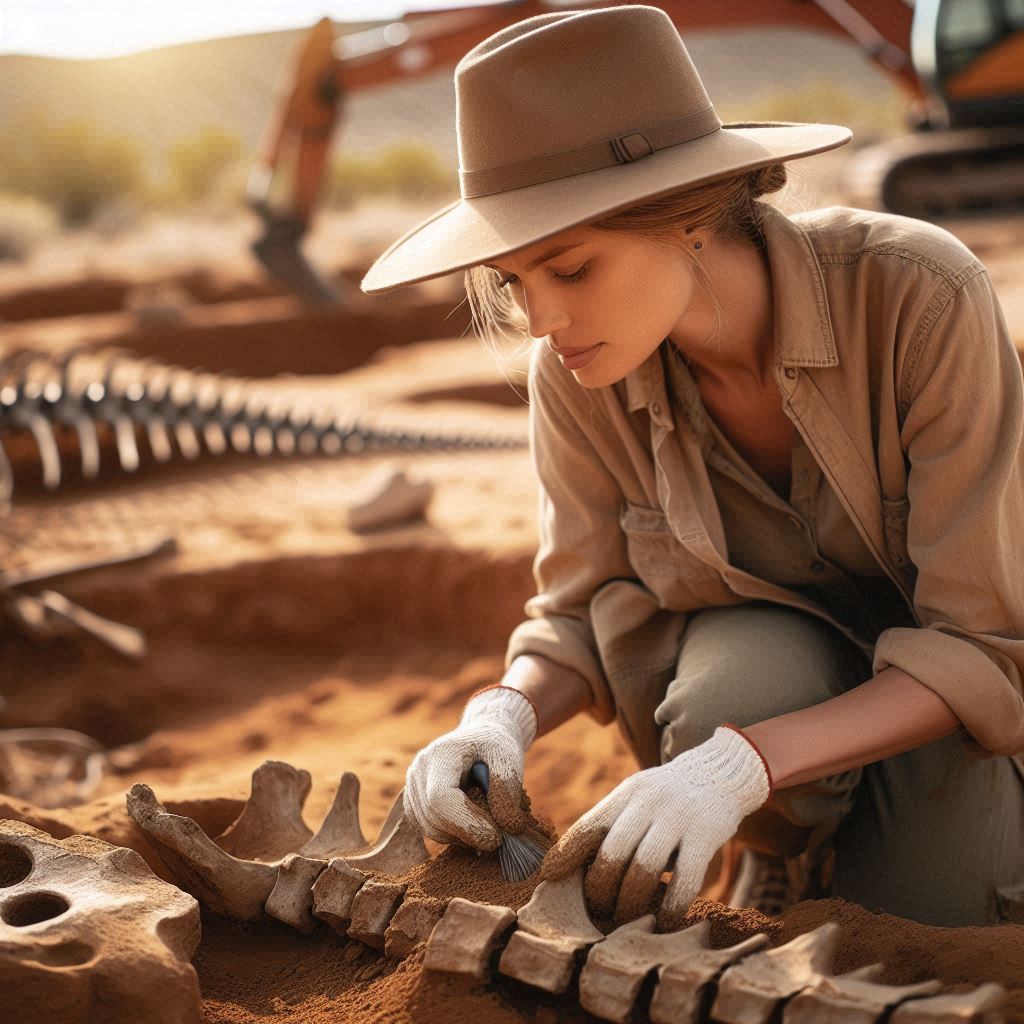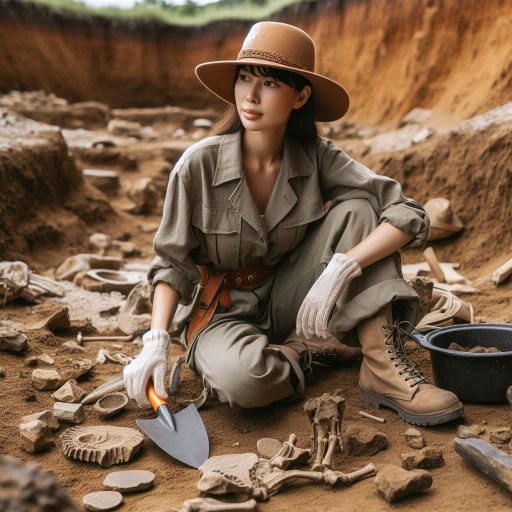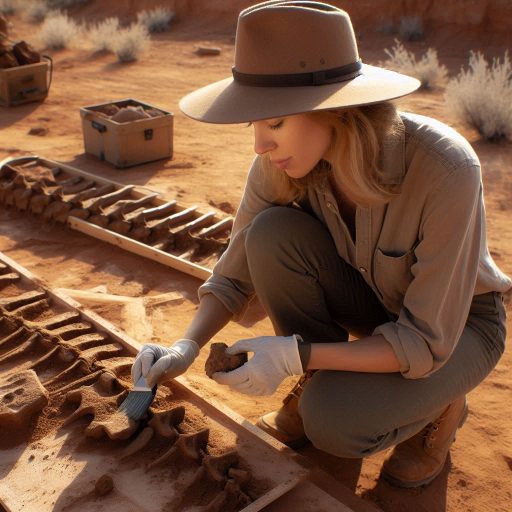Introduction
Archaeology is a fascinating career that explores human history through material remains.
It combines science, art, and humanities to uncover the past.
Archaeologists study ancient civilizations, artifacts, and cultural landscapes, providing insight into human behavior and development.
Possessing specific skills is crucial for success in this field.
Archaeologists must navigate complex tasks, often working in challenging environments.
Mastering essential skills ensures they conduct research effectively and make informed decisions.
Several top skills are vital for a successful career in archaeology.
Research skills allow archaeologists to gather and analyze data thoroughly.
Fieldwork skills enable them to excavate sites and document findings accurately.
Critical thinking helps them evaluate evidence and solve problems creatively.
Strong communication skills foster collaboration and effective presentation of results.
Cultural sensitivity ensures respect for diverse communities and their histories.
Technological proficiency enhances data analysis and preservation techniques, while time management enables effective scheduling and task prioritization.
By developing these skills, aspiring archaeologists can excel in their careers and make meaningful contributions to our understanding of history.
Research Skills
Research skills are vital for anyone pursuing a career in archaeology.
Archaeologists rely on thorough research to uncover, analyze, and interpret historical and cultural information.
The ability to conduct thorough research enables archaeologists to gather the data needed for understanding ancient civilizations, artifacts, and human history.
Conducting Thorough Research
To excel in archaeology, you must be capable of conducting thorough and accurate research.
This involves sifting through vast amounts of historical records, academic articles, and archaeological reports.
It also means examining and cross-referencing various sources to ensure the information is reliable and relevant.
A strong foundation in research helps archaeologists make informed decisions when excavating, analyzing artifacts, and forming conclusions about past societies.
Every archaeological discovery begins with a solid research foundation, so being thorough is crucial.
Knowledge of various research methods and techniques
In archaeology, knowing various research methods and techniques is equally important.
Archaeologists use a mix of qualitative and quantitative research approaches.
Qualitative research involves analyzing historical texts, oral histories, and cultural traditions to gain insight into ancient peoples and their lives.
Quantitative research often includes scientific methods such as radiocarbon dating or statistical analysis of artifacts to determine their age, origin, or usage.
Mastering these diverse methods equips archaeologists to approach problems from different perspectives and develop well-rounded theories.
Archaeological research isn’t confined to books and articles.
Much of it occurs in the field and laboratory.
Fieldwork involves exploring archaeological sites, documenting findings, and gathering samples for further study.
The data gathered must be meticulously recorded for later analysis.
In the lab, archaeologists use advanced technologies such as X-rays, DNA analysis, and chemical testing to examine artifacts.
Both field and lab research are essential components of archaeological work and require excellent research skills to be successful.
Analyzing and Interpreting Data
Once research is complete, archaeologists must analyze and interpret the data.
The ability to synthesize information from different sources and make connections between findings is critical.
Archaeologists look for patterns, cultural significance, and broader historical contexts in the data.
This process is complex, requiring critical thinking and attention to detail.
Archaeologists often work with large datasets, so proficiency in using statistical software, databases, and other tools is a significant advantage.
Proper analysis allows archaeologists to draw conclusions about human history, providing valuable insights into ancient civilizations.
Research skills are the backbone of archaeological work.
They enable archaeologists to gather, analyze, and interpret data effectively.
Mastering these skills is essential for anyone serious about a career in archaeology.
Fieldwork Skills
Fieldwork is a cornerstone of archaeology, where professionals directly interact with excavation sites and artifacts.
Having strong fieldwork skills is essential for anyone pursuing an archaeological career.
Fieldwork skills allow archaeologists to explore, document, and interpret historical sites accurately and effectively.
Excavation Experience
Excavation is the most hands-on aspect of archaeology.
An archaeologist needs experience in excavation techniques to uncover artifacts and remains safely and efficiently.
The ability to excavate with precision is critical, as improper handling can damage valuable artifacts or ruin their historical context.
Excavation involves working with different tools, from small brushes to larger digging equipment, depending on the site‘s complexity.
Knowing when to use the right tool and understanding the fragility of objects is crucial for ensuring the site’s integrity.
Experience in various excavation methods is also vital, as each site presents unique challenges, such as different soil types or depths.
Surveying Archaeological Sites
Before excavation begins, archaeologists must survey the site.
Site surveying involves walking the site, observing features, and collecting data about the landscape.
Archaeologists use surveying techniques to identify key areas for excavation and ensure accurate documentation of the site.
The ability to recognize historical significance in terrain features or soil composition is essential during this phase.
Additionally, archaeologists often use geophysical tools like ground-penetrating radar and aerial surveys to locate hidden artifacts or structures before digging.
Mastering these skills ensures archaeologists can efficiently survey a site, saving time and resources.
Mapping and Recording Techniques
Once fieldwork begins, accurate mapping and recording are vital.
Archaeologists must understand how to map a site to document artifact locations, site layout, and geological features.
This information provides context for findings and helps other researchers analyze the site later.
Techniques like using GPS technology, grid systems, and detailed sketches are part of this process.
Recording each artifact‘s location and depth is critical for reconstructing past events or cultural practices.
Proficiency in these techniques allows archaeologists to create accurate and reliable site records, preserving valuable historical data.
Physical Endurance and Adaptability
Fieldwork in archaeology is physically demanding.
Archaeologists often work in various environments, from deserts to rainforests, sometimes in extreme weather conditions.
Physical endurance is crucial, as excavation involves long hours of manual labor, including digging, lifting, and crouching.
In some cases, archaeologists must carry heavy equipment over uneven terrain.
Moreover, the ability to adapt to different environments is essential.
Each site presents unique challenges, whether it’s dealing with heat, cold, rain, or insects.
Archaeologists must maintain focus and precision despite these conditions, making physical stamina and adaptability necessary traits.
Fieldwork skills form the foundation of an archaeologist‘s practical experience.
Mastery in excavation, surveying, mapping, and physical endurance ensures success in exploring and preserving historical sites.
Without these skills, archaeological discoveries and insights would be impossible.
Read: Exploring the Different Branches of Geology
Critical Thinking
Critical thinking is a core skill for anyone pursuing a career in archaeology.
Archaeologists constantly evaluate evidence, solve problems, and make decisions that shape their understanding of the past.
Developing strong critical thinking skills allows archaeologists to interpret complex data, draw meaningful conclusions, and approach challenges creatively.
Evaluating Evidence and Making Logical Deductions
In archaeology, the ability to evaluate evidence is crucial.
Archaeologists work with fragments of history, often incomplete or ambiguous.
The skill of analyzing artifacts, structures, or documents and making logical deductions is essential to understanding ancient cultures.
Archaeologists must examine each piece of evidence within its context, asking questions such as, “What does this artifact tell us about the people who used it?”
“How does this structure relate to the surrounding environment?”
By using logic and careful observation, archaeologists piece together the past in a way that makes sense and supports their research.
Solving Complex Problems
Archaeologists frequently encounter complex problems during fieldwork, research, or artifact analysis.
Critical thinking enables them to approach these problems systematically, weighing different factors and considering multiple possibilities.
For example, when dealing with incomplete data, archaeologists must decide how to proceed without making assumptions that could compromise their findings.
They assess various solutions, consider the evidence, and choose the best course of action.
Making Informed Decisions
Archaeologists often face decisions that impact their research and fieldwork.
Making informed decisions based on evidence and analysis is crucial.
Critical thinking helps archaeologists assess the available information, consider potential outcomes, and make choices that lead to reliable conclusions.
For instance, deciding where to dig at an archaeological site requires careful thought and a deep understanding of the terrain, historical context, and available resources.
Each decision influences the success of the project, so archaeologists must rely on critical thinking to ensure they make the right choices.
Thinking Creatively and Outside the Box
Archaeology also demands creative thinking.
Many archaeological discoveries come from thinking outside the box and approaching problems in innovative ways.
When traditional methods or explanations don‘t provide answers, archaeologists must explore alternative possibilities.
Creative thinking helps archaeologists reimagine how ancient societies lived, worked, and interacted with their environments.
This skill allows archaeologists to develop new theories, explore uncharted territories, or try novel research techniques.
Creativity in archaeology leads to breakthroughs that shape our understanding of history.
Critical thinking is a key component of archaeological work.
Mastering these skills is essential for a successful career in archaeology.
Read: Top Skills Needed for a Successful Geology Career
Transform Your Career Today
Unlock a personalized career strategy that drives real results. Get tailored advice and a roadmap designed just for you.
Start NowCommunication Skills
Strong communication skills are essential for a successful career in archaeology.
Archaeologists must present their findings clearly and collaborate effectively with others.
Whether working with colleagues, stakeholders, or the public, strong verbal and written communication is crucial to convey complex information.
Verbal Communication Skills
Archaeologists need strong verbal communication skills to explain their work clearly to different audiences.
Whether presenting research at conferences or discussing findings with team members, the ability to speak confidently and concisely is key.
In the field, archaeologists must communicate instructions to their team during excavation or survey work.
They often work with professionals from other disciplines, such as historians or scientists, who may not be familiar with archaeological terms.
Using clear and simple language ensures everyone understands the project‘s goals and findings.
Written Communication Skills
In archaeology, written communication is equally important.
Archaeologists produce detailed reports, academic papers, and articles to document their research and discoveries.
Writing clearly and effectively is necessary to ensure their work reaches a broader audience.
Good writing skills allow archaeologists to explain their findings in a way that is accessible to both scholars and the general public.
Written reports also serve as records for future research, making clarity and accuracy essential.
Archaeologists must be able to structure their writing logically, present evidence clearly, and draw meaningful conclusions.
Presenting Findings Clearly and Effectively
A key part of an archaeologist‘s job is presenting findings to various audiences, from academic peers to museum visitors.
Archaeologists need to distill complex data into understandable formats.
This often involves creating presentations, charts, and visual aids to help explain their discoveries.
Effective presentation skills help archaeologists engage audiences, answer questions, and make their research more accessible.
Collaboration with Team Members
Archaeology is a collaborative field, and strong communication is vital for working well with others.
Archaeologists often collaborate with colleagues, historians, geologists, and local communities during their research.
The ability to communicate ideas and listen to others‘ perspectives ensures smooth collaboration.
In the field, clear communication is critical for coordinating efforts, ensuring safety, and sharing data.
Archaeologists also collaborate with museums, universities, and other organizations, so they need to effectively convey their needs and findings to stakeholders.
Engaging with Stakeholders
Archaeologists frequently work with stakeholders, such as government agencies, funding bodies, and local communities.
Strong communication skills are necessary to explain the significance of their work and secure support for projects.
By clearly articulating the value of their research, archaeologists can build relationships and gain the trust of those involved.
Communication skills are essential for archaeologists.
Mastering both verbal and written communication ensures that their work is understood, appreciated, and supported by a wide range of audiences.
Read: The Future of Botany: Emerging Fields and Innovations

Cultural Sensitivity
Cultural sensitivity is vital for archaeologists working with diverse cultures and communities.
Respecting cultural heritage and ethical considerations is essential in preserving the integrity of the past.
Archaeologists must develop an awareness of the people, traditions, and histories connected to their research.
Respect for Diverse Cultures and Heritage
Archaeologists work with artifacts and sites that belong to various cultures, each with its own heritage.
Showing respect for these cultures is crucial for responsible archaeology.
Understanding the significance of objects and sites within their cultural context helps archaeologists handle them with care and consideration.
Archaeologists should avoid imposing their own cultural biases when interpreting artifacts or excavating sacred sites.
Instead, they must approach every project with an open mind and a deep respect for the beliefs, customs, and values of the people they are studying.
By respecting diverse cultures, archaeologists help ensure their work honors the past.
Understanding Ethical Considerations
Ethics play a major role in archaeology.
Archaeologists are responsible for ensuring that the artifacts they study are treated with dignity and respect.
They must be mindful of ethical guidelines when excavating, handling, and preserving historical objects.
This includes being aware of the legal and moral implications of removing artifacts from their original locations.
In some cases, artifacts may belong to indigenous groups or local communities who view them as sacred.
Archaeologists must carefully consider the wishes of these groups before proceeding with research or excavation.
Understanding and following ethical practices helps archaeologists avoid harm and maintain the integrity of their work.
Sensitivity to Local Communities
Archaeologists often work in areas where local communities have a deep connection to the sites being studied.
Being sensitive to these communities and their histories is essential.
Archaeologists must recognize that their work can impact people who view these sites as part of their heritage.
Engaging with local communities, listening to their concerns, and respecting their wishes are important steps in fostering trust.
Archaeologists should also involve community members in the research process when possible, ensuring that they benefit from the knowledge gained.
This collaboration helps preserve the cultural significance of sites and fosters positive relationships between archaeologists and local populations.
Working in Multicultural Environments
Archaeologists frequently work in multicultural teams or across international borders.
Cultural sensitivity is necessary when interacting with colleagues and stakeholders from different backgrounds.
Understanding cultural differences in communication styles, work ethics, and traditions ensures smooth collaboration.
Archaeologists must remain open to learning about other cultures and adapting their approaches accordingly.
By showing respect and sensitivity, archaeologists can build stronger, more inclusive working environments.
Cultural sensitivity is crucial in archaeology.
Read: What Does a Geologist Do? Career Overview and Insights
Technological Proficiency
Technological proficiency is essential in modern archaeology.
Mastering digital tools, mapping software, and remote sensing techniques allows archaeologists to enhance their research and preservation efforts.
Technology streamlines fieldwork, data analysis, and site documentation, making it a critical component of archaeological practice.
Familiarity with GIS Mapping Software
Geographic Information System (GIS) mapping software plays a crucial role in archaeology.
GIS enables archaeologists to visualize spatial data, track artifact locations, and analyze site distributions.
Proficiency in GIS allows archaeologists to create detailed maps that provide a deeper understanding of archaeological sites.
These maps help researchers track excavation progress, identify patterns, and share findings with others.
GIS software also assists in managing large datasets, which improves accuracy and efficiency in the field.
By mastering GIS, archaeologists gain the ability to map and interpret archaeological sites more effectively.
Using Remote Sensing Techniques
Remote sensing has revolutionized archaeology by allowing researchers to detect and analyze buried features without excavation.
Techniques such as aerial photography, satellite imagery, and ground-penetrating radar help archaeologists locate structures, artifacts, and landscapes.
Understanding remote sensing technology enables archaeologists to study sites with minimal disturbance to the environment.
This non-invasive approach is especially important in preserving sensitive or sacred areas.
Archaeologists can survey large areas quickly, identify potential excavation sites, and minimize the risk of damaging important artifacts.
Mastering remote sensing techniques is essential for efficient and responsible archaeological work.
Knowledge of Geophysical Survey Methods
Geophysical survey methods provide another layer of technological support in archaeology.
Techniques like magnetometry and electrical resistivity detect underground structures and anomalies.
These methods help archaeologists pinpoint areas of interest before digging, allowing for more targeted excavation.
Geophysical surveys are often used in combination with GIS and remote sensing, providing a comprehensive view of archaeological sites.
Archaeologists skilled in these techniques can analyze subsurface features and make informed decisions about where to focus their efforts.
Mastery of geophysical survey methods enhances an archaeologist‘s ability to uncover hidden elements of the past.
Utilizing Technology for Data Analysis and Preservation
Technology also plays a crucial role in data analysis and preservation.
Archaeologists use digital tools to analyze artifacts, conduct 3D modeling, and archive their findings.
Digital databases allow researchers to organize and compare data from different sites, improving collaboration and research accuracy.
Technology also aids in the preservation of artifacts and sites by creating detailed digital records.
These records ensure that even if physical artifacts degrade, their information remains intact for future study.
By utilizing technology in these ways, archaeologists enhance the longevity and accessibility of their research.
Technological proficiency is vital for archaeologists today.
Time Management
Time management is a critical skill for archaeologists.
Balancing research, fieldwork, and administrative tasks requires prioritization and effective organization.
Archaeologists must manage their time efficiently to meet deadlines and adapt to unforeseen challenges in both fieldwork and research settings.
Showcase Your Business Today
Reach thousands of readers actively exploring professional services. Publish your business profile and grow your audience now.
Publish NowPrioritizing Tasks and Meeting Deadlines
In archaeology, projects often involve multiple phases, from planning and excavation to data analysis and reporting.
Archaeologists must prioritize tasks based on project deadlines and importance.
They may need to decide which tasks require immediate attention and which can be delayed.
For example, ensuring that excavation occurs during optimal weather conditions may take precedence over analyzing artifacts in the lab.
Prioritizing tasks ensures that projects stay on track and important deadlines are met.
Archaeologists must also allocate enough time for each phase of a project, ensuring they deliver accurate and thorough work without rushing.
Organizing Fieldwork Schedules
Fieldwork often operates on tight timelines, and archaeologists need to organize their schedules efficiently.
Proper planning ensures that they make the most of limited time on-site.
Archaeologists must schedule tasks such as site surveys, excavations, and artifact cataloging, ensuring that every team member knows their role.
Coordinating these activities minimizes downtime and maximizes productivity.
Organizing logistics, such as travel, equipment, and labor, is equally important for fieldwork success.
By efficiently organizing fieldwork schedules, archaeologists reduce the risk of delays and make progress within the allotted timeframe.
Efficient Research Project Management
Archaeologists often handle multiple research projects simultaneously.
Time management skills help them stay organized and manage these projects effectively.
They must break down large tasks into manageable steps, set realistic deadlines, and track their progress.
For example, when conducting research, archaeologists may need to juggle literature reviews, artifact analysis, and report writing.
Organizing these tasks ensures that each step is completed on time.
Using tools such as project management software, archaeologists can maintain a clear overview of their responsibilities.
This organizational approach helps them stay focused, meet deadlines, and avoid last-minute stress.
Adapting to Unexpected Challenges
Fieldwork rarely goes as planned, and archaeologists must adapt to unexpected challenges.
Weather conditions, equipment failures, or new discoveries can disrupt plans and schedules.
Time management skills enable archaeologists to adjust their schedules and priorities when unforeseen events occur.
If a site becomes inaccessible due to rain, archaeologists might shift focus to indoor lab work or data analysis.
Flexibility and adaptability are key to staying productive in changing circumstances.
By remaining calm and reassessing their priorities, archaeologists can navigate unexpected challenges without compromising the project‘s overall timeline.
Time management is an essential skill in archaeology.
Education and Training
Education and training are fundamental for a successful career in archaeology.
A strong academic background, ongoing professional development, and specialized certifications equip archaeologists with the knowledge and skills needed to thrive in the field.
Pursuing a Degree in Archaeology or a Related Field
A degree in archaeology or a related field is essential for aspiring archaeologists.
Most professionals begin with a bachelor‘s degree in archaeology, anthropology, or history.
These programs provide foundational knowledge in archaeological theory, fieldwork techniques, and cultural history.
Courses in geology, biology, and environmental science can also enhance an archaeologist‘s understanding of excavation contexts.
A master‘s or doctoral degree is often necessary for those who want to pursue advanced research or academic careers.
Higher education programs allow students to specialize in areas like bioarchaeology, etc., preparing them for more focused work in their field of interest.
Continuing Education and Professional Development Opportunities
Learning does not stop after earning a degree.
Archaeologists must engage in continuous professional development to stay updated on new discoveries, technologies, and methodologies.
Attending workshops, seminars, and conferences helps archaeologists network with colleagues and stay informed on the latest research trends.
Many institutions and organizations offer short courses in areas like GIS mapping, remote sensing, and artifact conservation.
These courses allow archaeologists to develop new skills or deepen their expertise in specific areas.
Continuing education ensures archaeologists remain competitive and knowledgeable as the field evolves, helping them apply the most current techniques to their work.
Certification and Specialized Training in Archaeological Techniques
In addition to academic degrees, certifications and specialized training are crucial for developing expertise in specific archaeological methods.
Many archaeological projects require certification in excavation techniques, artifact preservation, or safety procedures.
Field schools offer practical, hands-on experience in excavation, surveying, and site management.
Certification from reputable institutions or organizations enhances an archaeologist‘s credentials and can open doors to more specialized roles.
Specialized training in underwater archaeology, for example, equips archaeologists with the skills needed to explore submerged sites.
Similarly, bioarchaeologists may seek training in osteology to analyze human remains effectively.
These certifications help archaeologists demonstrate their proficiency in important, field-specific skills.
Gaining Field Experience Early
Field experience is a key part of archaeological training.
Aspiring archaeologists should participate in excavations, internships, or volunteer projects during their studies.
Practical fieldwork experience allows students to apply classroom knowledge in real-world settings, helping them refine their skills.
Early field experience also helps archaeologists build a network of professional contacts and gain insight into the challenges of working on archaeological sites.
This hands-on experience is critical for securing jobs and advancing in the field.
Education and training are essential for a career in archaeology.
Pursuing relevant degrees, engaging in ongoing professional development, and obtaining specialized certifications prepare archaeologists for success.
Explore Further: Career Opportunities for Soil Science Graduates
Conclusion
Developing key skills is essential for a successful career in archaeology.
Research skills allow archaeologists to gather and analyze information effectively.
Fieldwork skills enable them to conduct excavations and document findings accurately.
Critical thinking helps them evaluate evidence and solve complex problems.
Strong communication skills foster collaboration and the clear presentation of findings.
Cultural sensitivity ensures respect for diverse communities and their histories.
Technological proficiency enhances data analysis and preservation techniques.
Finally, effective time management allows archaeologists to meet deadlines and adapt to unexpected challenges.
Aspiring archaeologists should focus on enhancing these skills throughout their education and training.
Engaging in internships, workshops, and fieldwork experiences provides invaluable opportunities for growth.
As they develop their skill sets, they will find archaeology to be a fulfilling career.
Archaeology not only uncovers the past but also impacts our understanding of human history.
By pursuing a career in archaeology, individuals contribute to preserving cultural heritage and educating future generations.
This rewarding journey invites passion, dedication, and a commitment to lifelong learning.
Embrace the adventure of archaeology and make a meaningful difference in the world.
[E-Books for Sale]
The Big Book of 500 High-Paying Jobs in America: Unlock Your Earning Potential
$19.99 • 500 High-Paying Jobs • 330 pages
Explore 500 high-paying jobs in America and learn how to boost your career, earn more, and achieve success!
See All 500 High-Paying Jobs of this E-Book
1001 Professions Without a Degree: High-Paying American Jobs You Can Start Now
$19.99 • 1001 Professions Without a Degree • 174 pages
Discover 1001 high-paying jobs without a degree! Unlock career tips, skills, and success strategies for just $19.99!




